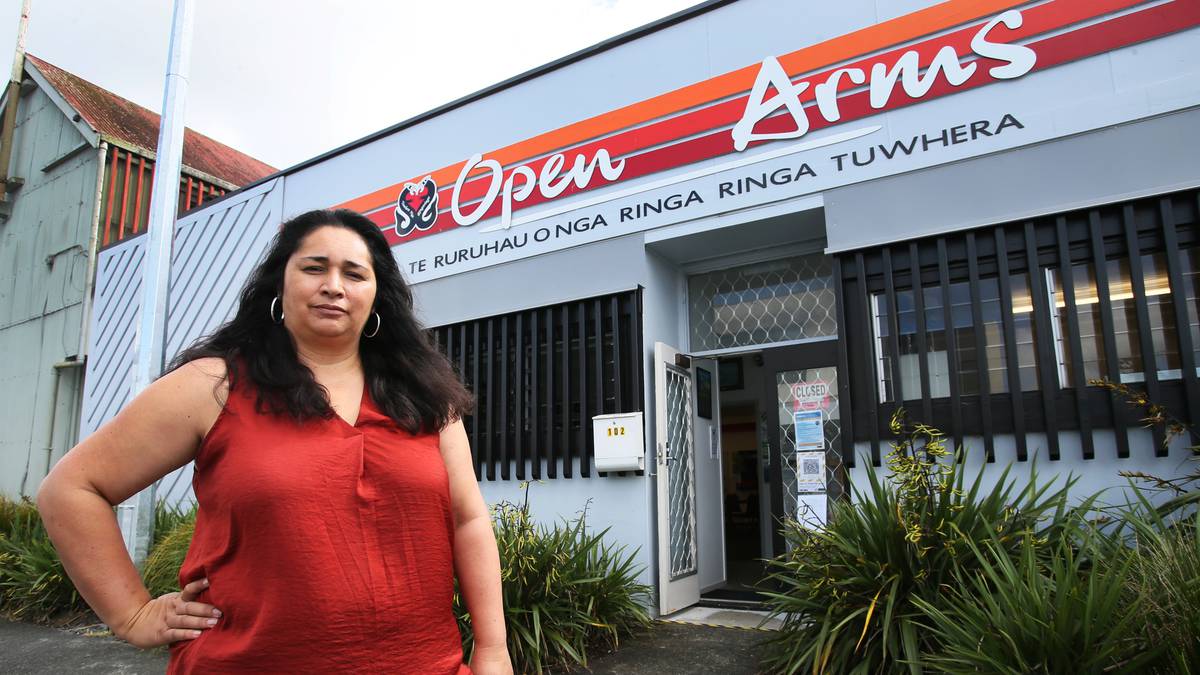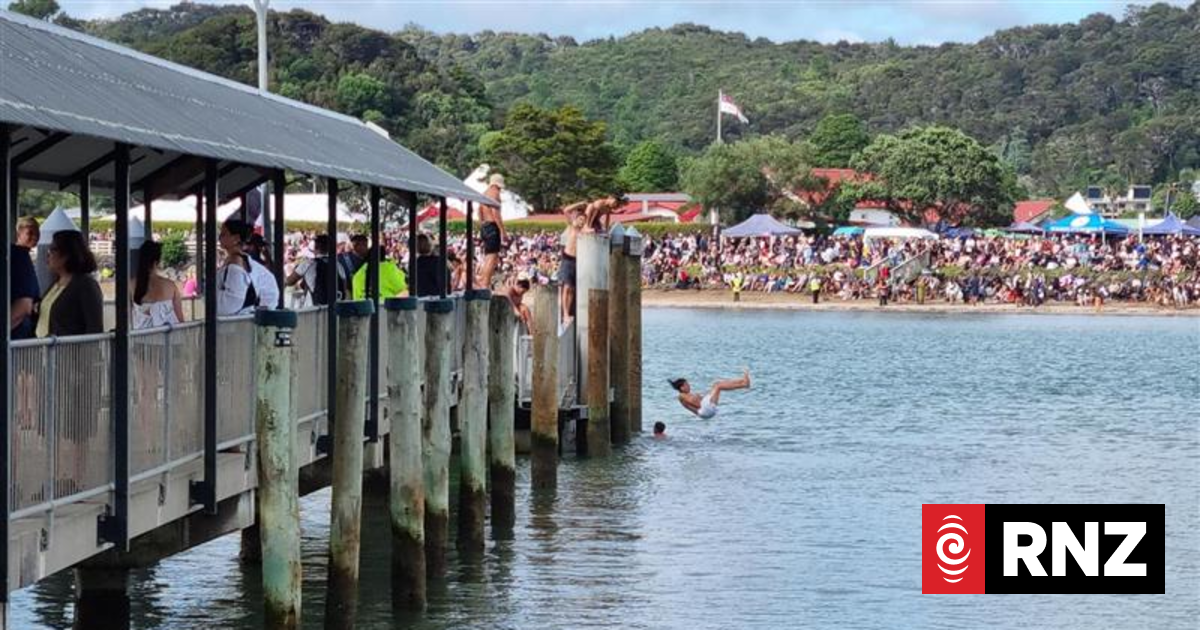Liz Cassidy-Nelson, chief executive of 155 Whare Āwhina, says some families just don’t have enough money to get through the week. Photo / Tania Whyte
Northland families are turning to food parcels and other emergency support as the cost of living bites, and the latest statistics show national child poverty rates are unchanged.
Figures released by Statistics NZ on Thursday
showed child poverty had not moved in the year to June 2022 although there had been a decrease since 2018. The statistics are based on the percentage of children living in low-income households and experiencing material hardship.
No regional data was available for the year to June 2022, following issues with data collection due to the Covid pandemic. In 2021, Northland had the highest percentage of children living in low-income households – 18.6 per cent.
Liz Cassidy-Nelson, chief executive of 155 Whare Āwhina, said there were huge numbers of whanau coming through its social supermarket and 155 Open Arms day centre needing food.
“We are supporting them through Work and Income but there are still people that on a weekly basis simply do not have enough money. We work with them and we provide other support but it’s simply not enough because the baseline income is just far too low.”
“We’ve seen a massive increase in middle-income working families coming through the whare kai [social supermarket].”
Covid and Cyclone Gabrielle had exacerbated the existing poverty issue in Northland, Cassidy-Nelson said.
“Children often become invisible and get lost. The impact for those children who are in a vulnerable situation anyway, the impact on their schooling, the impact on their health and wellbeing is huge and it just continues to escalate.”
Advertisement
Cassidy-Nelson said her organisation had seen a “massive increase” in the number of middle-income, working families at the social supermarket and the Government needed to do more to ensure people have enough money to live on.
/cloudfront-ap-southeast-2.images.arcpublishing.com/nzme/OT5ADDS4GBEHBM5ESFEOF6IWUQ.JPG)
Therese Wickbom, whose charity the Bald Angels helps clothe, feed and support vulnerable Far North families, said she’s getting “far more referrals and requests for emergency support than we’ve ever had”.
”Nothing has changed in the last 10 years I’ve been with Bald Angels,” Wickbom said.
”What I’m seeing is it’s a societal issue. If we have young people leaving school, feeling disconnected, without the skills to take into life, then they are going to become more disconnected as time goes by.
”They’re going to stay unemployed, have children, and those children are coming into homes where there’s no steady income, they’re growing up with poverty as their normal.
”When you start to see generations of people accepting poverty as normal, I feel hopelessness is entrenched in that.”
While the cost of living is “going up for everyone”, raising the minimum wage doesn’t help, Wickbom said.
”All that does is push the cost of goods up, and possibly put more pressure on everyone overall.
Advertisement
”It feels like the right thing, but it’s actually not solving anything, just making it harder all around.”
/cloudfront-ap-southeast-2.images.arcpublishing.com/nzme/SEBJ44FKGUCQYCTHZKTVYBD6RQ.jpg)
Horahora School principal and Te Tai Tokerau Principals’ Association president Pat Newman said the effects of child poverty had eased to some extent by the Government-sponsored lunch programme, which meant children were no longer hungry at school.
“Most of our kids are getting breakfast, lunch and there are apples and fruit in between so that’s a huge improvement on five years ago.”
“The Government initiative on food is probably the greatest initiative we have had to counter the effects of poverty on our children.”
Newman said families were still struggling financially, however, with some having difficulty feeding their children at home.
“I just had a parent who is from a very good, proud family who said, ‘Can we get a food parcel? We’ve just been hit with bills this week and there is nothing left.’”
The housing shortage in Whangārei and the skyrocketing rents that resulted had hit families hard, Newman said.
“The disparity is what’s causing a hell of a lot of our issues within society and we actually have to address it,” he added.
He Korowai Trust chief executive Toddy Shepherd said until issues around housing and social security are addressed nothing will improve the child poverty statistics.
”I can’t see it changing if the government does not address the issues around people’s homelessness at the beginning of the housing continuum.”
/cloudfront-ap-southeast-2.images.arcpublishing.com/nzme/GIU4MBMWHJBO3FPKGUDXA32UMI.jpg)
Shepherd said government officials, including the Ministry of Social Development, need to visit small rural communities like Kaitaia to understand them and help, “not sit behind their desks and rewrite policies”.
”It’s about appropriate support,” she said.
”They need to talk to providers and people working on the ground who are working with families with these issues.
”There is so much more the government could be doing if they came and had a talk to us.”
The Salvation Army is calling for the Government to do more to help “the tens of thousands of children who continue to live in poverty”.
Director of the Salvation Army’s social policy and parliamentary unit, Lt-Colonel Ian Hutson, said despite high levels of employment and incomes rising, the gap between families on lower incomes and those on middle and higher incomes is not closing fast enough.
”This is not surprising when there are over 209,000 children in households relying on government income support.
”Many of those households with children have incomes below one of the official poverty lines. Working families on low incomes need extra help too.”
Hutson said the government needs to “go beyond recent announcements that simply adjust some welfare payments for inflation”.
”We are calling for further increases in core benefit rates, Working For Families and Accommodation Supplement housing support payments to levels that ensure families on lower incomes have enough to meet the costs of basic participation in society.”



